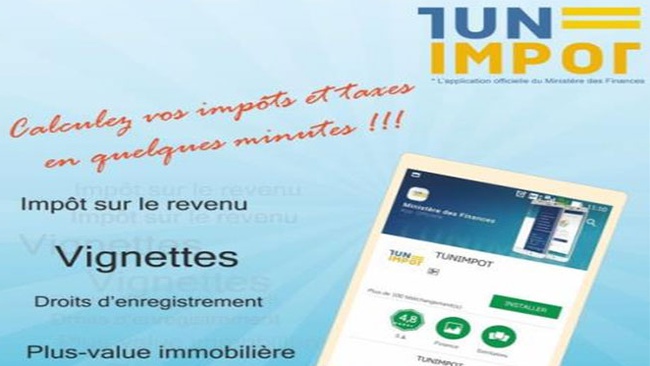TUNIMPOT development started in 10/2016 and went live in 05/2017
TUNIMPOT is a free personal income tax calculator that uses Android and iOS technologies. It can be downloaded on Google Play and the App Store. The application’s design is simple, practical and functional. After downloading the application, taxpayers can anonymously run scenarios for five types of taxes. Every tax category and technical terms included in TUNIMPOT are described on the application. It is intended for individual taxpayers who are earning an income, and it includes the most important and the most common tax scenarios and rates, so that the taxpayers can determine their liabilities in an accurate manner. To build TUNIMPOT, the project recruited Medianet, a local Tunisian IT firm. Medianet worked with the tax administration to develop a user-friendly and up-to-date tax application. Once it was built, 1-to-1 Polling, a Tunisian polling company, implemented an app usability (“beta”) testing to see how actual users interacted with the features to make last minute improvements.
Two months after its launch, around 7000 users have downloaded TUNIMPOT. The result is very encouraging, as general studies show that Tunisian users mostly download applications in other categories. The application greatly simplifies the process of calculating personal taxes, by instantaneously addressing taxpayers’ most frequently asked questions. Because it will be updated regularly by the Ministry of Finance IT center, it provides reliable, current and accurate information. It is provided to the taxpayers for free, with the objective of making tax information public and thus, improve voluntary compliance. TUNIMPOT empowers the taxpayers with accurate knowledge of their tax situation before they engage with the tax administration, which enhances their understanding of taxes, perception of transparency and highlights the administration commitment to taxpayers’ rights. In the long term, the application will allow the administration to reallocate staff to more productive areas.
One challenge was the complexity of the tax legislation that makes it difficult to stay updated with information. It is the reason why the tax administration and the developers decided to build the first version for individual taxpayers, and not for businesses. Businesses have other tools to assist them. The tax administration does not usually share information with private sector companies. Multiple consultations demonstrated that through inclusion, all stakeholders benefit from the process.
This application can be replicated in other countries that have economic growth projects, countries where resource mobilization is a challenge. Tunisia, as other developing countries, faces multiple resources mobilization issues, such as lack of transparency, lack of modernization, lack of financial resources and complex legislation. Building an application in an environment where people can rely on technology will improve taxpayers’ perception and relationship with the tax administration.
